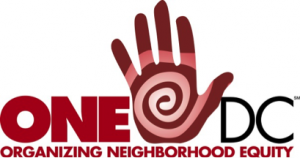The following is an excerpt from the new research report, Hearing from Those We Seek to Help: Nonprofit Practices and Perspectives in Beneficiary Feedback. ONE DC was one of three randomly selected nonprofit organizations whose leaders rated them in the CEP survey as understanding their beneficiaries extremely well, collecting feedback through five or more methods, and using that feedback to a great or extreme extent to improve their work.

Interviewee: Dominic Moulden, Resource Organizer
Location: Washington D.C.
Year established: 1997
Annual expenses: $377,383
Number of staff and volunteers: 6 staff and 50 volunteers
About the organization: ONE DC’s mission is to create and preserve economic and racial equity in D.C. through grassroots community organizing, popular education and direction action. The organization serves Washington D.C. residents, focusing on long-time D.C. residents, particularly African-Americans and low-income residents, and has dues paying members who are engaged in building movements and some of whom are volunteers with ONE DC.
Why listen to beneficiaries? Resource Organizer Dominic Moulden says, “It’s important for ONE DC, because we emphasize in our organizing model that we want to practice transformative organizing; and the way you do that is to listen to the voices of the people most impacted.” ONE DC seeks input from its beneficiaries to ensure that its work reflects their issues and concerns.
How is feedback from beneficiaries collected? Through a mix of methods including canvassing in neighborhoods, asking members to provide confidential feedback through 360 degree evaluations about their experiences working with the organization’s staff and volunteers, and campaign meetings. Some campaign meetings serve as listening sessions, “where we take direct feedback from our target population. We try to explain to people that it doesn’t mean that we can do everything that people ask us to do, but it means that we’re fully engaged in a meaningful and respectful conversation with the people impacted. And we’re getting direct input and feedback from those residents,” explains Moulden.
What’s an example of feedback received and used? Moulden hears lots of feedback about big and small ways the organization can improve. For example, one long-time member criticized the healthiness of the food provided at evening and weekend meetings. “Most people might think that’s a minor issue,” says Moulden, “but with low-income people and people with a lot of children, you’ve got to look after that. When we first started, we always provided food and drink for residents, because we have a lot of weekend and night meetings. So now, with our resources limited and tight, sometimes we can’t provide food and drink, or we might not provide the most healthy food and drinks. But it is important to us, because it’s people’s health.”
ONE DC’s strategic direction has also been shaped by input from members. For example, during a campaign meeting on right to income issues, members raised the concern that residents often struggled to find jobs despite participating in multiple job training programs. Members asked ONE DC to help address the problem and so the organization led an eight-year organizing effort that resulted in legislation being passed to tie government workforce development efforts to placement in jobs. Moulden says “it was one of the first times in D.C. history that a training program was attached directly to the job.”


